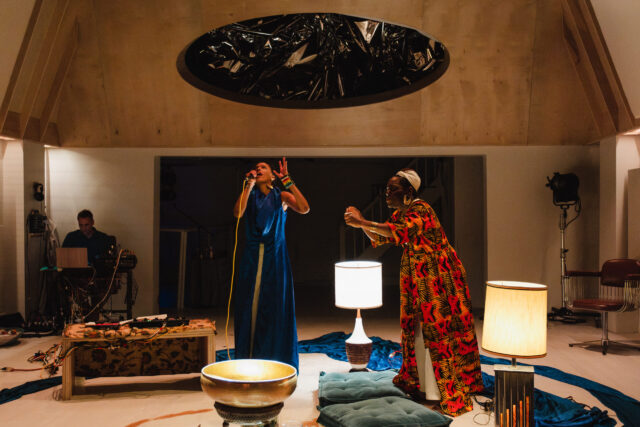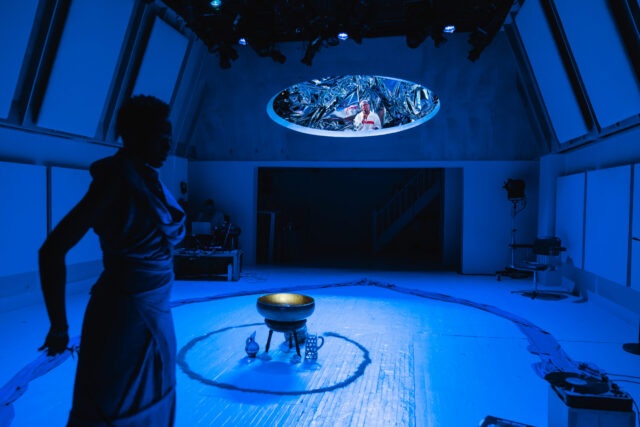
Ben Jalosa Williams, Jillian Walker, and Stephanie Weeks star in The Whitney Album at Soho Rep (photo by Lanna Apisukh)
THE WHITNEY ALBUM
Soho Rep
46 Walker St. between Broadway & Church St.
Tuesday – Sunday through July 2, $45 ($.99 Sundays)
sohorep.org
Whitney Elizabeth Houston died on February 11, 2012, at the age of forty-eight; the cause of death was “drowning” and “effects of atherosclerotic heart disease and cocaine use.” The Newark-born singer and actress, who has sold more than two hundred million records, serves as inspiration for a celebration of Black woman creators in Jillian Walker’s The Whitney Album, a ritual performance continuing at Soho Rep through July 2.
In the lobby is a table where everyone is invited to say a prayer, set an intention, use essential oils, pour wanter into a vessel, or add the names of Black femme ancestors, honoring “the legacy of the Black Divine Feminine and the souls that have crossed over.”
As the audience enters the theater proper, Stevie Wonder’s seminal 1976 double album, Songs in the Key of Life, a favorite of Houston’s, is playing on a small turntable on the floor. (There are several other records in a pile, so they might alternate music on any given night.) Peiyi Wong’s set is a welcoming space with two cushions between a pair of floor lamps, a bench with ritual objects and sound equipment on it, and a round gold bowl in the center, all surrounded by a circle of purplish blue fabric. There’s a rolling chair stage left; in the far corner is a keyboard and more audio equipment, where sound designer Ben Jalosa Williams sits; a dark room looms in the back as a place for devotion; and an oval cutout above the dark room features sparkly silver mylar. Oona Curley’s lighting changes colors to set different moods. Large wood rectangles on the walls offer surprises when opened by Walker and her cohort, Stephanie Weeks.
The audience is encouraged to wear white clothing and take their shoes and socks off as a way to participate in the experience. Divided into three sections — “A Lecture in Love,” “The exhale scenes,” and “The Alice Prophecy” — the show begins with Gogo (Walker) walking up the first few steps into the audience and, while making gentle, intimate eye contact with everyone, explains that she recently did not get a full-time professorship at Harvard and studied to become an Afro-indigenous priest. “One of the main things I’ve been trained to be, to do, in my practice is to find things that are hidden, to bring hidden things into the light,” she says. “I do this by calling on my Ancestors and listening to them to guide me to what is seemingly lost.”

Jillian Walker’s The Whitney Album is a ritual performance honoring Black femme creators (photo by Lanna Apisukh)
For ninety minutes, Gogo directly and indirectly references Nikki Giovanni, bell hooks, Phillis Wheatley, Lauryn Hill, Suzan-Lori Parks, Lucille Clifton, Alice Coltrane, and Alice Childress, cotton fields, slavery, and chains, while exploring the fame that built up and then beat down Whitney Houston. Walker seeks to show that Whitney was more than just “the Voice,” that she was a person with a body, a soul, a heart, a wife and a mother, battling against “colonial temporalities.” Gogo asks, “How do I/we honor Whitney Houston by way of Sally Hemings? How do I/we create a just historical space for her legacy?”
Gogo and Stephanie sing an alternate national anthem. Whitney gets into a bathtub and has a conversation with her longtime assistant and partner, Robyn Crawford. Clips of Whitney sharing her thoughts and dreams with the media occasionally are heard or projected. An interview with a white journalist (Williams), arranged by Whitney’s mother, Cissy, to restore her daughter’s reputation, is re-created. Gogo and Stephanie put on costumes (by Jojo Siu) and wigs (by Earon Nealey) that match Whitney’s. Whitney admits to Robyn, “All I wanted was to hold on to myself, you know?, while I gave myself away, my whole self. And that included the parts other people didn’t like, because they weren’t shiny, they didn’t fit to reflect the light.” Gogo and Stephanie add more water to the golden vessel.
The show concludes with Gogo asking for members of the audience to join her, Stephanie, and Ben on the floor for two final songs with singalong parts.
Directed by Jenny Koons (Regretfully, So the Birds Are; Theatre for One: I’m Not the Stranger You Think I Am), The Whitney Album can be haphazard, like a record that doesn’t always gel from song to song but has many special moments. It might not be Songs in the Key of Life, but it doesn’t have to be; it’s enchanting and confusing, mystical and metaphysical, spiritual and capricious. But it’s also uniquely beautiful as it takes on how Black woman creators become trapped by a consumptive history that treats them unfairly.
“Come to my ashram, too,” Gogo says after praising Alice Coltrane. “My temple is open.” And all are welcome.